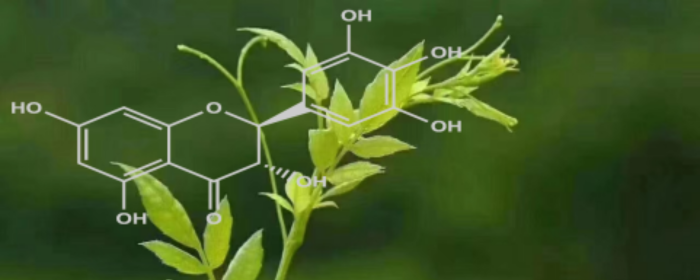
In the ever-evolving realm of cosmetic ingredients, natural ingredients become great allies to skin health. Dihydromyricetin (DHM), a flavonoid with intense activity, purified primarily from the Japanese Raisin Tree (Hovenia dulcis), is fast gaining recognition throughout the industry. Long valued in Eastern medicine for liver protection and hangover mitigation, DHM’s potency-rich biological activity profile is now being harnessed into its numerous strengths in topical skincare applications.
The Science Behind DHM’s Skin Benefits
DHM’s efficacy in cosmetics is due to its potent antioxidant and anti-inflammatory activity, based on the unique chemical structure:
- Potent Antioxidant Shield: DHM is a potent free radical quencher, unstable molecules generated by exposure to sunlight, environmental pollution, and stress that accelerate skin aging. By eliminating these offensive molecules, DHM prevents damage to essential skin components like collagen and elastin fibers. This translates into a reduction of visible signs of aging such as fine lines, wrinkles, and loss of firmness. Experiments show its antioxidant potential to be higher even than established ingredients like Vitamin C (ascorbic acid) in certain instances.
- Calming Inflammation: Low-grade, chronic inflammation is a major root cause of many skin problems, including sensitivity, redness (rosacea, eczema), acne, and premature aging. DHM effectively modulates inflammatory processes, inhibiting pro-inflammatory cytokine formation (signaling proteins). Thus, it emerges as a great ingredient for soothing irritated skin and allowing a more comfortable, balanced face.
- Brightening and Clarifying: Recent research indicates DHM can inhibit the activity of tyrosinase, the primary enzyme responsible for the production of melanin. By breaking this cycle, DHM suppresses the formation of hyperpigmentation – dark spots, sun spots, and melasma – promoting an even and bright complexion. Its anti-inflammatory action also helps reduce post-inflammatory hyperpigmentation (PIH) that persists after acne lesions heal.
- Collagen Support & Protection: In addition to protecting collagen from oxidative stress, there is evidence that DHM can even support collagen synthesis pathways. Supporting the structural integrity of the skin, it adds to the overall plumpness and elasticity.
Integration into Cosmetic Products
| Product | DHM Concentration | Key Benefits | Combinations |
| Serums | 0.5% – 2% | Potent antioxidant, brightening, deep skin penetration of actives | Vitamin C, niacinamide, peptides |
| Moisturizers & Creams | 0.1% – 1% | Long-lasting antioxidant protection, hydration, anti-aging support | Hyaluronic acid, ceramides, peptides |
| Eye Creams | 0.1% – 1% | Reduces puffiness, dark circles, fine lines; anti-inflammatory & antioxidant | Caffeine, peptides, vitamin E |
| Acne Treatments & Soothing Lotions | 0.2% – 1.5% | Calms redness, reduces post-acne marks, inhibits melanogenesis | Niacinamide, salicylic acid, tea tree oil |
| Sunscreens & Daytime Defense | 0.1% – 1% | Enhances UV protection, prevents photoaging, neutralizes free radicals | Zinc oxide, avobenzone, vitamin E |
Notes:
- DHM is often stabilized with glycerin, propanediol, or other solubilizing agents.
- Concentrations vary based on formulation goals but typically range from 0.1% to 2%.
Safety and Considerations
DHM is generally regarded as safe to apply topically to the skin in cosmetics. It is of low irritation potential and hence worthwhile even on sensitive skin if properly formulated. Like all actives, however, patch testing is recommended, especially in known sensitizers. While evidence for topical efficacy is promising and growing, long-term clinical evidence for use on the skin is not as strong as for some more classic cosmetic actives. This is where established brands come into play, assuring purity and stability in their formulations.
The Future of DHM in Beauty
As consumer demand for high-performance, science-driven natural actives continues to grow, DHM can become a staple in next-generation skincare. Its heritage of treating multiple major concerns – aging, inflammation, pigmentation, and environmental protection – with a strong safety profile makes it an appealing and practical ingredient. As clinical trials continue to affirm its cosmetic benefits, we will see DHM becoming the standout ingredient in advanced serums, targeted treatments, and intensive anti-aging regimens, solidifying itself as a force to be reckoned with in modern skincare science.
Stanford Chemical offers over 1,300 herbal extract products, including Dihydromyricetin (DHM). If you require any of our products, please feel free to contact us to GET A QUOTE.
